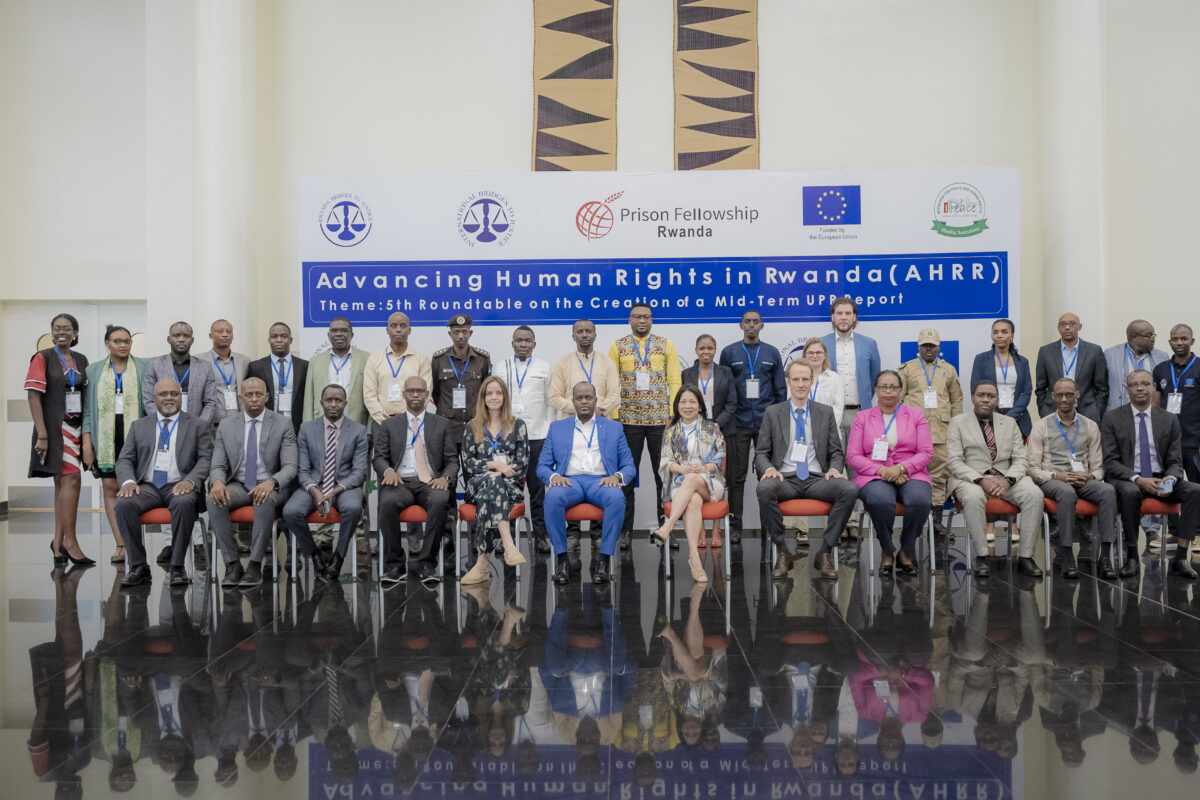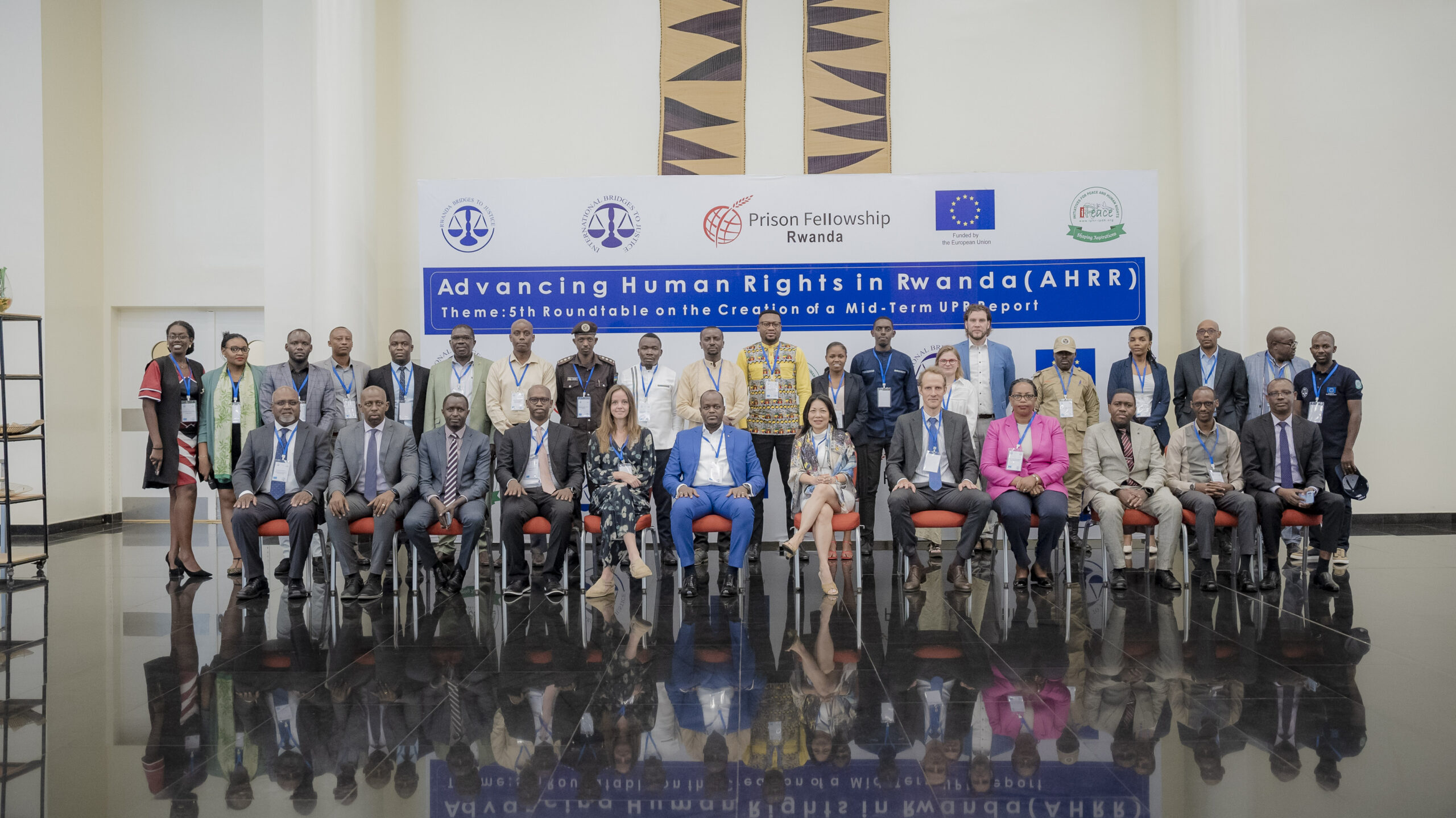
On the 31st July 2024, Rwanda Bridges to Justice (RBJ) and International Bridges to Justice (IBJ) hosted a national level roundtable event in Rwanda, in collaboration with iPeace and our sister organization. This event, part of the broader “Advancing Human Rights in Rwanda” project, brought together a diverse coalition of human rights advocates and justice sector stakeholders. The event was attended by esteemed leaders within the field of criminal law and justice, including Mrs. Umurungi Providence, Chairperson of the National Commission for Human Rights (NCHR) and Mr. William Ndengeyingoma, Senior State Attorney at the Rwanda Ministry of Justice. Additionally, we were honored to include representatives from five organizations with which RBJ has established Memorandums of Understanding: the National Commission on Human Rights, Rwanda Correctional Services, Rwanda Investigation Bureau, National Prosecution Authority and Rwanda Bar Association. Our overarching aim was to foster open conversation, share experiences, and develop actionable recommendations for strengthening Rwanda’s justice system.
Roundtable Schedule – Panels, Discussions, and Speeches
The roundtable event opened with welcoming remarks from Me. John Bosco Bugingo, President of Rwanda Bridges to Justice, and Karen Tse, CEO of IBJ. Dr. Žygimantas Juška, Economic Attaché at the European Union (EU) Delegation, followed with a speech highlighting the EU’s steadfast commitment to promoting human rights and justice in Rwanda. An address was given by Mrs. Umurungi Providence, Chairperson of the National Commission for Human Rights (NCHR), who commended the strong collaboration between NCHR and RBJ in advancing human rights initiatives.
The event featured two panel discussions, each tackling critical issues within Rwanda’s justice system. The first panel, moderated by Me. Nkundabarashi Moise, President of the Rwanda Bar Association, focused on the achievements of the Universal Periodic Review (UPR) and the future direction of the Advancing Human Rights in Rwanda project. Panelists voiced concerns over the current lack of legal assistance available, particularly for vulnerable populations and youth, and discussed how coordinating efforts across organizations can address this gap. A senior prosecutor and an Inspector General of National Prosecution Authority, Mr. Ntete Jules Marius from the audience promoted the use of alternative dispute resolution methods to reduce case backlogs.
The second panel spotlighted UPR Advocacy Champions, featuring organizations like Citizen Rights and Development, Empower Rwanda, Stand for People Sustainable Development, and the Rwanda Organisation of Persons with Deaf Blindness. These groups shared their experiences and strategies in promoting human rights under the UPR framework.
The event concluded with closing remarks from RBJ Program Manager and IBJ International Program Director, Mr. Sanjeewa Liyanage, who expressed gratitude to the participants for their open-minded discussions. He highlighted the mutual respect and trust that have become the foundation of collaboration within Rwanda’s legal community and the need to work collaboratively and constructively to sustain system change in advancing access to justice.
Notable Successes of Previous Roundtables
Our four previous roundtable events have yielded significant and tangible results, demonstrating the power of collaborative dialogue in driving policy change. At our inaugural roundtable, three recommendations that emerged from the discussions, among many others, were swiftly adopted by policymakers.
The first recommendation was the incorporation of progressive alternatives to detention into Rwanda’s criminal justice framework. Responding to community demands for options such as probation, rehabilitation, and treatment, the Ministry of Justice introduced Article 3.4.7 into the new criminal code. This amendment enshrines the principle of imprisonment as a last resort, reflecting a more humane approach to criminal justice.
In another vital development, the roundtable recommended the need for better training for correctional officers in addressing trauma and mental health issues among detainees. As a result, the Rwanda Correctional Service (RCS) initiated courses on human rights and mental health for its staff, ensuring that correctional officers are better equipped to manage these issues.
Finally, in response to our recommendation for increased access to early legal services–part of IBJ’s core mission—Rwanda Investigation Bureau (RIB) collaborated with law firms and civil society organizations, resulting in 72% of all handled cases receiving early assistance by a defense lawyer.
Role of Roundtables
The roundtables are a key facet of the Advancing Human Rights in Rwanda project, spearheaded by RBJ. In its opening two years, the initiative has already conducted six training sessions, provided legal assistance and representation to 836 detainees, and offered psychosocial support to 870 inmates. During their presentation, Willis Odhiambo Okul and Vincent Tengeye Makokha noted the remarkable progress the project has made in empowering civil society leaders, human rights defenders, and service providers, enhancing the capacity of justice stakeholders across the board.
Furthermore, roundtables serve as a point of discussion for how to implement the United Nations’ (UN) Universal Periodic Review (UPR) recommendations. The UPR process, a comprehensive review of the human rights record of all UN member states, offers a detailed framework for improving human rights in Rwanda. However, as Mr. William Ndengeyingoma from the Ministry of Justice highlighted during his speech, the recommendations are often highly technical and require careful interpretation and a coordinated effort for effective implementation.
The roundtable format provides a collaborative environment where justice community members can strategize on how to best align Rwanda’s justice practices with these global standards. Additionally, it gave the opportunity to spotlight the trailblazing work of UPR Advocacy Champions, individuals who have worked tirelessly to set the groundwork for UPR implementation in their communities. For example, the organization Empower Rwanda emphasized their work in combating gender-based violence and promoting gender equality through local awareness campaigns.
These discussions play a crucial role in bridging the gaps between various stakeholders in the justice sector. By facilitating a platform for dialogue, participants gain insights into the challenges and perspectives unique to each segment of the system. This exchange not only enhances mutual understanding but also ensures that innovative ideas for justice reform are heard and realized.
